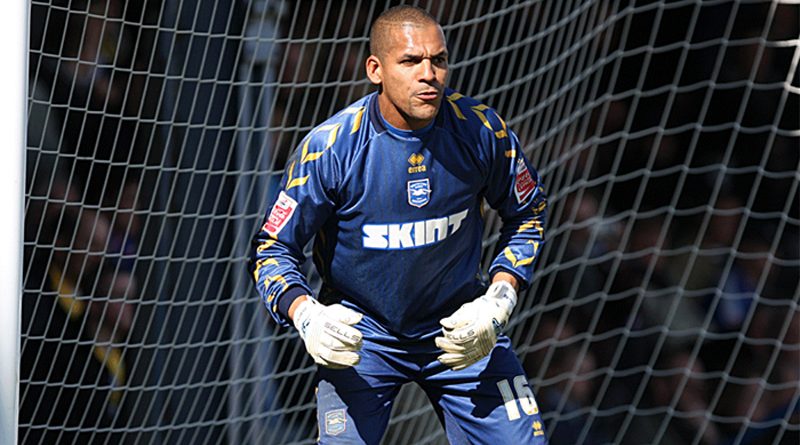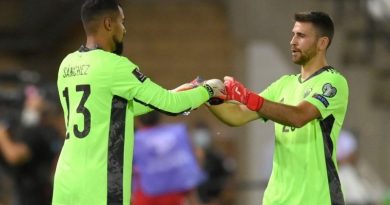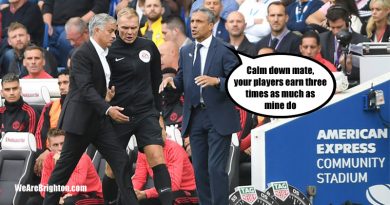How to become a sports agent
When Brighton & Hove Albion players retired 20 years ago, those who didn’t attempt to take up coaching or management seemed to move into one trade over any other – becoming a publican.
Bert Murray, the first Albion ‘people’s player’ bought from Birmingham City with money raised by supporters become landlord of a pub in Market Rasen, close to where he played his final games as a professional for Peterborough United.
Gerry Ryan famously owned The Witch in Lindfield for many years, even turning out for the pub’s football team in the Sussex Sunday League – can you imagine rocking up to Waterhall hungover on a Sunday morning to find yourself marking one of the star’s of Brighton’s 1983 FA Cup run?
Mark Morris captained Brighton for the 1-1 draw away at Hereford United in May 1997 which kept the Albion in the Football League.
He went onto become landlord of the Crown and Sceptre in Bournemouth. In 2009, Morris made headlines when he confronted a knife-wielding attacker who had broken into the pub and was attempting to make off with the till.
Albion players who retire in the 21st century seem to be taking a different post-playing route with their careers. Rather than turning their hands to the pub game, a number of former professionals have instead become football agents.
Michel Kuipers represents Jurgen Locadia. When Kuipers was keeping an eye on his client during Locadia’s time at the Albion, he would often shun the prawn sandwich seats in favour of watching games among the Brighton fans in the away end.
Gillingham-era striker Jamie Moralee had the highest profile client of any ex-Brighton-player-turned-agent. One-time England captain Rio Ferdinand was represented by Moralee and his New Era Global Sports company – set up by Moralee and former Albion right back Peter Smith in 2008.
Then there is David Lee. The midfielder had a pretty forgettable Brighton career after signing from Hull City as part of a swap deal which sent Matthew Wicks to Boothferry Park in 2002, playing just seven times in two-and-a-half years for the Albion.
He was the man however who spotted the potential in Lewis Dunk even before Dunk made his Brighton debut as an 18-year-old away at Milton Keynes Dons in 2010. Lee has been Dunk’s agent ever since.
It will be Lee who negotiates Dunk transfer away from the Albion, which seems likely to happen before the start of the 2020-21 season.
After all, Dunk has earned the chance to prove himself with a bigger and better club than Brighton – not to mention the fact that a move to a team playing in Europe would improve his chances of going to Euro 2020 with England. The latest sports betting markets price him up only as an outside chance.
Lee could be due a bumper pay day if Dunk completes a big money move to one of the Premier League’s big six. Nice work if you can get it – which you actually can.
The idea of a career in professional sport often appears to many people to be unachievable, unless you are seriously talented. But there are many other ways to combine a passion for football, cricket or rugby than by becoming a player or coach.
Becoming a sports agent is one. While the likes of Kuipers, Moralee and Lee were all former players, the vast majority of football agents are not.
The Portuguese super agent Jorge Mendes used to own a bar and nightclub. Here, he met Nuno and eventually helped engineer the goalkeeper’s move from Vitória de Guimarães to Deportivo de La Coruña. Within 20 years of that first deal in 1996, he was the world’s most powerful sporting agent.
Paul Pogba’s agent Mino Raiola makes nearly as many headlines as the French superstar. He began life working in his father’s restaurant before moving into sport.
His dealings with Pogba have made him so rich that he can used his share of the €105 million transfer fee which took Pogba from Juventus to Old Trafford to buy the former Miami home of one of America’s most famous mob bosses, Al Capone, for €9 million.
It’s relatively straightforward to become a sports agent. All football agents must be registered with the Football Association as an intermediary.
You will undergo a test of good character and reputation as well as a criminal background check before you are registered. There is then a £500 registration fee to pay.
There is little point in registering to become an agent if you don’t understand the requirements of the job, however. Given that much of it involves contracts and legal documents, an understanding of contract law is essential.
Likewise, you need to have a grasp of business management. Many higher education establishments are realising the growing market potential here and run specialised sporting business management courses and qualifications which can provide the ideal starting point for an agent’s career.
As with any industry, you need experience. Leading sports agencies offer voluntary internships and placements for you to learn the ropes and build up a CV. Unpaid work can often lead to a full time position.
Working with an agency will also give you a base to start building up contacts. Ultimately, that is what makes an agent successful – having a vast network of clients who you can help make the right career moves.
Attending matches allows you to spot talent before others do – as Lee did with Dunk. Get to know club officials and they might tip you off about the brightest new player coming through their academy.
Meet new players, meet parents and friends. It can also be helpful to forge friendships with members of the press who have their ears to the ground and attend many hundreds of games every season too. They’ll often spot a big thing before they become big.
Once you’ve worked in-house as an agent for a while, you can then consider striking out on your own.




